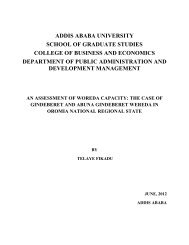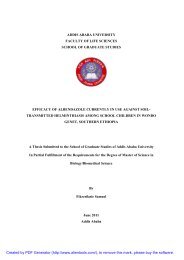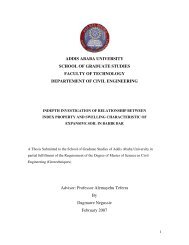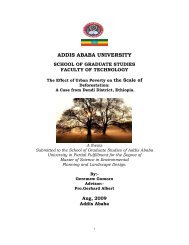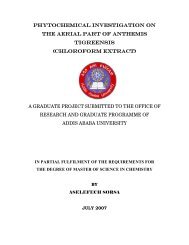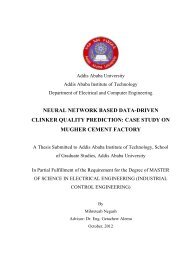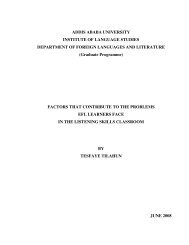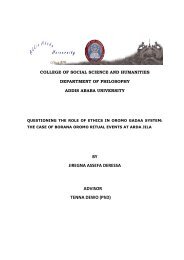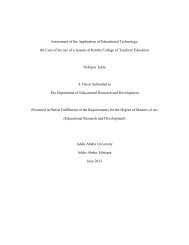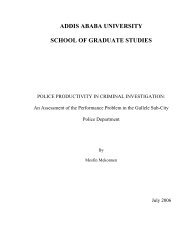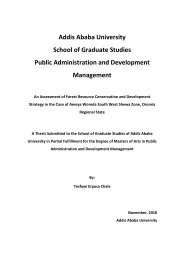HENOK MERHATSIDK 1.pdf - Addis Ababa University
HENOK MERHATSIDK 1.pdf - Addis Ababa University
HENOK MERHATSIDK 1.pdf - Addis Ababa University
You also want an ePaper? Increase the reach of your titles
YUMPU automatically turns print PDFs into web optimized ePapers that Google loves.
with other upper riparian states of the Nile namely Burundi, Congo democratic republic,<br />
Kenya, Rwanda, Tanzania and Uganda by participating in Nile Basin Initiative. However, the<br />
hydro political tension in the Nile Basin has tremendous sources “1. Down stream insecurity<br />
versus up stream actions, 2. Lack of legal institutional framework, 3. Unilateral development<br />
of water resources, 4. Latent military threats and 5. The Afro-Arab divide.” Standing among<br />
such complicated issues, Ethiopia is trying to be part of legal institutional framework that can<br />
provide a win- win solution for all stakeholders (Yacob, 2007: 69-220). Ethiopia’s active role<br />
in Nile Basin initiative seems to bring beneficial outcomes; its patience for a decade gathered<br />
the other up stream states around its objective in establishing legal framework on equitable<br />
use of the Nile waters. The Cooperatives Framework of Agreement (CFA) of May 14 th 2010<br />
is great achievement for the entire up stream states that and they could use the badly needed<br />
fresh water for reversing poverty in their respective countries (Solomon, 2010).<br />
The CFA which is signed by Burundi, Ethiopia, Kenya, Rwanda, Tanzania and Uganda is<br />
opened to a signature for year duration seems to bring the like minded states of the East and<br />
Horn of Africa to the same position. Here the contribution of the Kenya government is<br />
crucial. Kenya is member of EAC (East African Community) and its influence on the East<br />
African states is considerable. Further more, the Ethio-Kenyan smooth relations have used as<br />
an input for holding the same position on the issue. Kenya is also playing a constructive role<br />
to convince Egypt and Sudan to sign the CFA. After the signing of CFA by majority of the<br />
up stream countries, Egypt and Sudan call for another alternative. However, the rest of<br />
member states hold firm position (reject the demand of down stream states). So Kenyan<br />
government officials went to Egypt and Sudan and pushing the Egyptian and Sudanese<br />
political elites, to sign the agreement and cooperate with the rest of the countries in jointly<br />
developing, protecting the Nile Basin (Solomon, 2010).<br />
In the eyes of many Ethiopians, the Nile waters have been source of enemies like Egypt and<br />
Sudan and the proxy wars of Somalia and Eritrea is in one way or another intimately<br />
interconnected, reaching agreement in the use of the Nile waters is a dual benefit for<br />
Ethiopia. Firstly, Ethiopia contributes 85% of the Nile; hence, whatever sort of logical<br />
68




